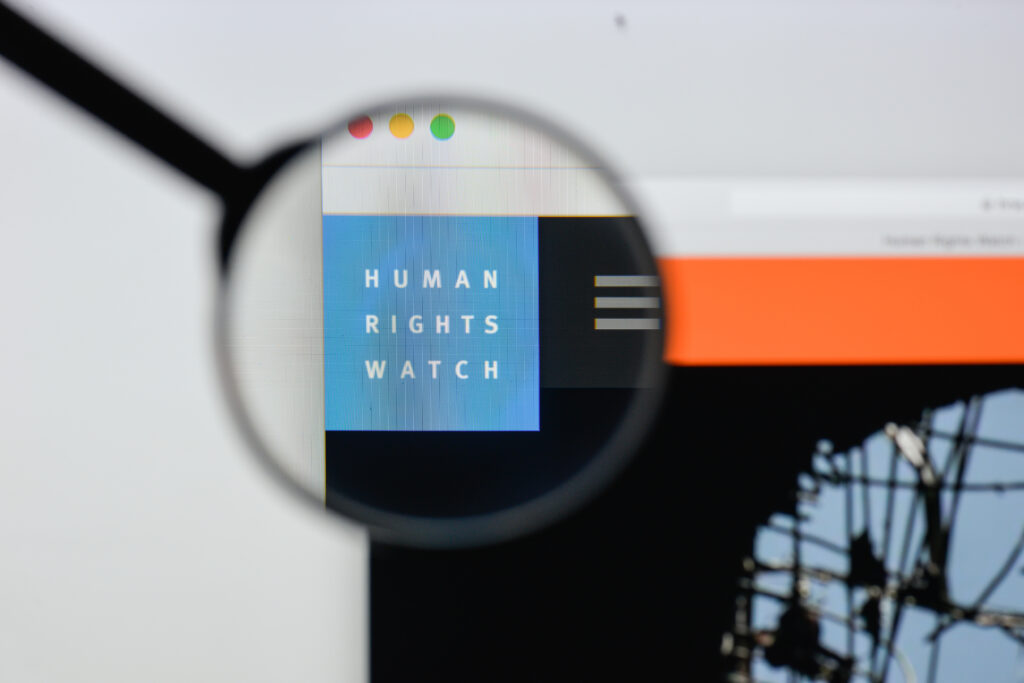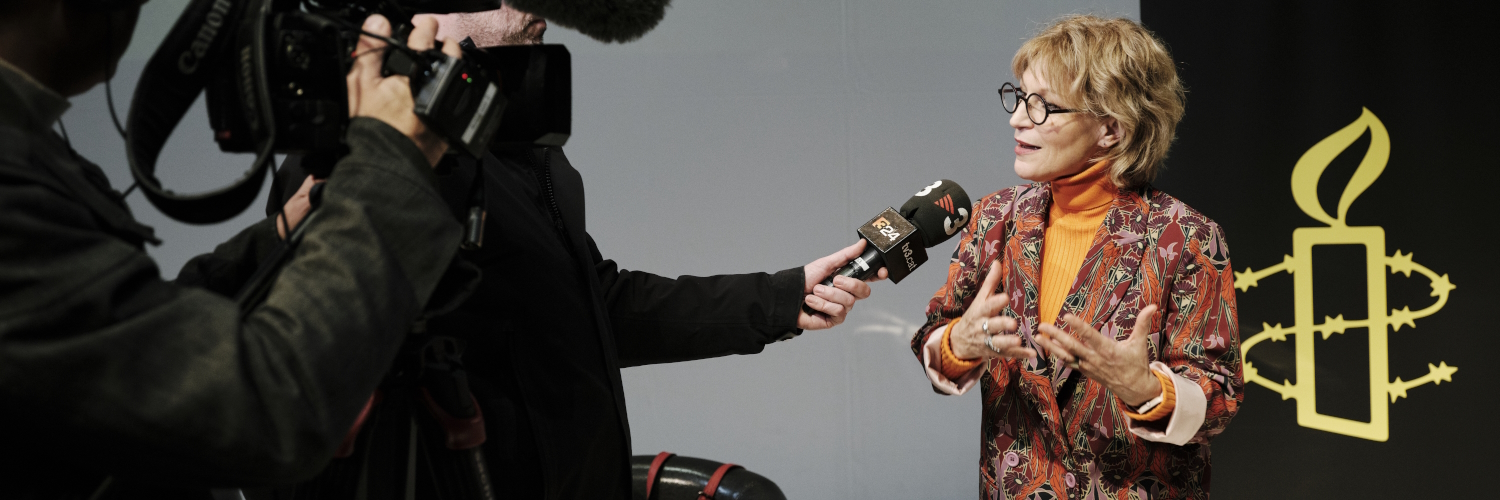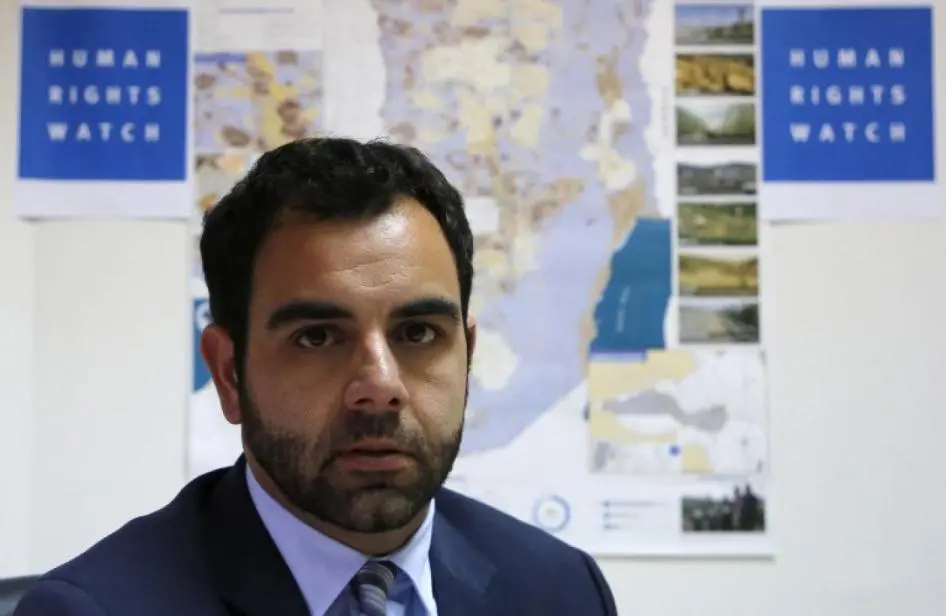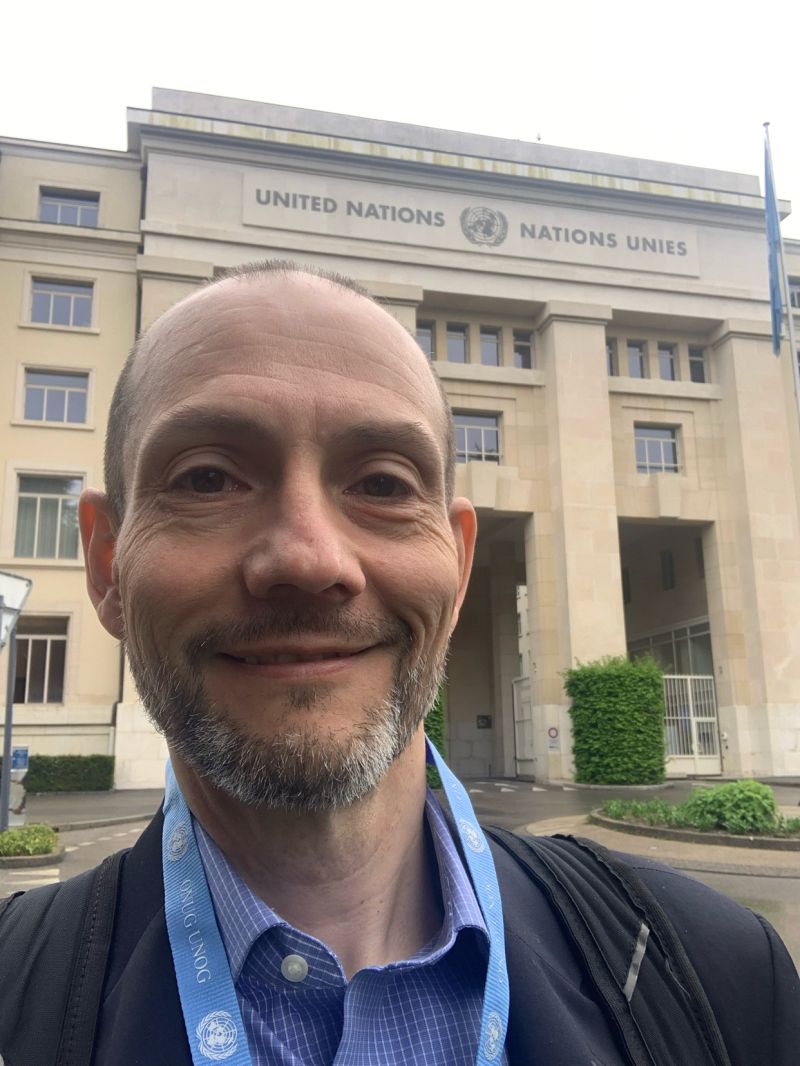Australia/Israel Review
Essay: When Rights groups go Wrong
Sep 24, 2024 | Danielle Haas

The corruption of the human rights establishment
Released with fanfare at a high-wattage press conference every year, the World Report is Human Rights Watch’s (HRW’s) flagship annual review of global human rights abuses. For 13 years I was its editor, overseeing a six-month production cycle that involved hundreds of staff and resulted in some 100 country chapters. I was the only person in the organisation to read every chapter, giving me a unique Afghanistan-to-Zimbabwe overview of their content and length. And every few years, noting its irregularity, I would raise the same question: “Why is the Israel-Palestine chapter so long?”
Not longer than a few chapters – longer than more than 90% of them, including those highlighting corrupt dictatorships sans free speech, repressive regimes in which women are second-class citizens, and countries that practise generational forced labour.
I tried again this July. “Is it so long because HRW invests more resources here?” I asked. “Thinks the abuses are more egregious than elsewhere? Has better access than to countries like North Korea and Iran? Whatever the reason, we should be transparent with readers.” But there never was a clear explanation, and after so many years, I did not need one.
The political and ideological creep in many NGOs has become so pervasive and deep-rooted that Israel has become their watchword of outrage, the focus of disproportionate attention, and the note to sound for signalling fealty to a human rights movement that is increasingly hijacked by politics and dominated by groupthink.
This must change. For too long, human rights groups have been granted a free pass to serve as society’s watchdogs without first proving they are fit to bark. Opaque, unelected, and largely unaccountable, they must finally be required to descend from their moral mountaintops and demonstrate in their own conduct the accountability and transparency they demand of others.
There have been signs for years that all is not well inside rights groups. In 2020, for example, it was revealed that HRW had accepted money from a Saudi donor (whose company it had identified as having committed labour-rights abuses) on the condition that the funds not be used to support LGBT advocacy in the Middle East and North Africa. (HRW later returned the donation.) It also faces allegations based on newly released documents that it accepted money from Qatar in 2018. (HRW has denied the claim.)
It was reported in April 2023 that Amnesty International’s board had for months sat on a critical report that showed the organisation had “not sufficiently substantiated” its claims from the previous year that Ukraine’s military had breached international law on protecting civilians by setting up bases in schools and counterattacking Russia from populated civilian areas. The report judged that Amnesty’s language was “ambiguous, imprecise, and in some respects legally questionable.”
Then came October 7. If there were doubts before Hamas’ massacres that the moral inputs and the conceptual and practical processing are gravely awry in NGO functioning, they were gone by Oct. 8.
As the only Jewish HRW staff member living in Israel over the past eight years, I was utterly shocked, along with the rest of the country, at the dystopian horror that unfolded from the moment the first missile siren wailed that Saturday morning. But over the hours, then days and weeks, that followed, a trauma of a different kind set in as I wrestled with the non-existent, muted, or distorted reactions to the largest massacre of Jews since the Holocaust from my roughly 600 colleagues at the rights-touting organisation where I had worked for so long.
Before I left in mid-November, I wrote via WhatsApp to one of the few colleagues who reached out to me following HRW’s clinical first public reaction to the bloodshed, which stated, “Palestinian armed groups carried out a deadly assault on October 7, 2023, that killed several hundred Israeli civilians and led to Israeli counter-strikes that killed hundreds of Palestinians.”
“I am at a loss,” I said. “How on earth can there not be one sentence that gives unequivocal space to what happened here in Israel… One line from HRW to note and condemn the absolute barbarity would have been the least. But it couldn’t.”
It couldn’t because, as October 7 and its aftermath made clear, the outrage of many rights monitors depends not on human rights principles, but on who is being abused and who is being accused.
These are groups that hurl stinging rebukes on a daily basis. “Heinous”, “abhorrent” and “morally reprehensible” were descriptions in their lexicons before October 7: They were used to describe Salvadorian state abuses, Singaporean hangings, and the UK’s pushback of migrants. After September 11, 2001, Amnesty was “appalled at [the] devastating attacks against civilians.” But on October 7, rights monitors lost their moral voice.
An “unprecedented operation by its fighters into southern Israel” is what Amnesty called Hamas’ mass slaughter and rapes. Others simply subsumed more than 1,200 murdered, mutilated, and kidnapped Israelis into such banalities as “military offensives” (Oxfam) and an “escalation in violence” (Save the Children).
Their responses reflected an escalation of a different sort that has been happening for years within many NGOs, where Israel has become so demonised that there is no space to see Israelis as victims, or to absorb nuance or voices that challenge their orthodoxies. In a conceptual universe where Israel is an occupier-coloniser-apartheid state, it is a priori the aggressor, regardless of the brutal human-rights abuses it suffers.

Amnesty International Secretary-General Agnes Callamard who failed to call for the release of Israeli hostages after October 7 (Image: Amnesty International)
“There’s no honor in unlawful attacks on civilians. No matter how just your resistance to apartheid and oppression is,” HRW’s program director Sari Bashi wrote on X (formerly Twitter) during the October 7 attack, trafficking in the language of virtue rather than morality. Israeli hostages were mentioned only twice in the X posts of Amnesty Secretary-General Agnès Callamard in the month of October; the posts did not call for their release.
More recently, in January 2024, rights groups had little to say about reporting that Gazan teachers, a social worker, and other staff of UNRWA – the UN agency ostensibly dedicated to helping Palestinian refugees – likely moonlighted on October 7 as kidnappers, killers, and RPG suppliers. Instead, many downplayed or presented the allegations as a mysterious human rights whodunnit, as an adviser in Amnesty’s regional office put it:
The #US + co. chose to freeze funds to @UNRWA, the biggest provider of aid in Gaza, based on what the Israeli government alleged a tiny fraction of staff did. Maybe they did, maybe they didn’t, we don’t know.
UNRWA apparently knew, though: It had already fired the staff members in question. And several major UNRWA donors were sufficiently convinced that they froze their funds – a “sickening” decision, wrote Amnesty’s Callamard in another X post, made because of the “alleged crimes of 12 people.”
Claims about the blurred lines between militants and aid agencies in Gaza have swirled for years, and a released Israeli hostage spoke in November of being held in an UNRWA teacher’s attic. Still, on Jan. 11, just two weeks before the UNRWA news, human rights groups were drawing a blank. “On the accusations that have been made against UNRWA,” HRW Executive Director Tirana Hassan told the UN, “Human Rights Watch has no evidence to give credibility to those claims.” Which demands the question: Did rights groups even look for evidence?
This same unhealthy scepticism of Israelis guided their response to the Hamas attacks themselves. Despite Hamas filming and livestreaming its own bloodletting, and the videos and survivor testimony saturating the media, on Oct. 9 HRW still referred to the “apparent deliberate targeting of civilians.” Only on Oct. 18 did it state with confidence that Hamas had intended to kill anyone, announcing it had “verified four videos” from October 7 “showing three incidents of deliberate killings.”
Because NGOs follow a course set by an existing narrative, “evidence” has relative value. When Israel finds Hamas tunnels beneath children’s beds, or third-party investigations reveal that Israel did not cause the deadly Oct. 17 blast at al-Ahli Hospital, these findings receive scant attention compared with Israeli abuses because, in the minds of NGOs and those who work there, they are mere inconveniences to the prevailing narrative that Israel is fundamentally to blame.
For instance, when the New York Times reported on Feb. 12 that al-Shifa Hospital was a hotbed of Hamas activity, Omar Shakir, with a dual portfolio as HRW’s Israel and Palestine director, did not feature this relevant information in any of his posts on X that day, or the next. Instead, his focus was on exports to Israel of Dutch fighter-jet parts and the release of a video clip from an Al Jazeera interview in which he paid familiar anaemic lip service to Hamas and its murders (or, in his words, “the people who carried out October 7th” and “involved the commission of grave crimes”) before returning to the usual script: “We’re here precisely because of years of impunity for grave abuses, including Israel’s apartheid against Palestinians.”

Human Rights Watch’s Omar Shakir (Image: HRW)
“Apartheid”
The word has been constantly on the lips and in the posts of NGOs and their staff before and after October 7 in reference to Israel. HRW’s 2021 report on apartheid accused Israel of employing an overarching policy “to maintain the domination by Jewish Israelis over Palestinians” and accused its officials of committing crimes of apartheid and persecution. Amnesty followed suit the next year, citing other NGOs that similarly criticised Israel.
These groups cannot stop using the term because the “apartheid” framing is part of a larger ideological messaging strategy used by some of them to pursue “narrative change” that seeks to proactively shape public thinking and rhetoric, including about Israel. In keeping with this model, human rights actors now focus on new allies and younger voices – including Hollywood players and social-media influencers – to circumvent traditional power structures. In 2023, HRW signed on with a Los Angeles-based talent-management firm committed to inserting its messages into popular culture.
NGOs are therefore dual actors. As activists, they have a mission to ensure that the message of so-called Israeli apartheid takes root in the wider world. But as self-described witnesses, they are dedicated to rigorous firsthand research that underpins their findings and recommendations.
There are at least two problems with this. The first is that the long-form, deeply researched reports that were once the trademark publications of HRW have been in decline for years. Short-form written pieces, multimedia output, and social-media quick hits now far outnumber them, with related changes in tone, nuance, and argumentation, not to mention the absence of consistent fact-checking.
The second problem is that the roles of activist and witness are fundamentally discordant. The former involves a ready-made mindset and imposition. The latter requires an open mind and exploration.
The reaction of NGOs to Hamas’ attack laid bare the troubles of their split identities, exposing which of the twin roles has become dominant. Because they were consumed with being “Israel apartheid” evangelists, rights groups failed to bear due witness to Hamas’ atrocities.
From here you get more than 100 Human Rights Watch researchers rushing after October 7 to sign a petition related to a pending press release about Israeli hostages. Their cry? Not for the organisation to be clearer and louder in condemning Hamas’ unspeakable sexual violence against women or its killing of babies. It was to demand from senior managers that the hostage-focused piece reference Israeli apartheid.
It’s no wonder that NGO staff members, both Jewish and non-Jewish, told me that, for years, they had raised concerns with managers and in wider discussion forums about antisemitism and methodological problems related to Israel work, only to face hostility at worst, inaction and indifference at best.
Most said they now self-censored because of their experiences. And over the years, I mostly did the same. But the points I made in an email to HRW’s general counsel in 2019, after Israel was the only country mentioned in every plenary session at the organisation’s annual New York gathering, remained true until I left. “The issue for me is not negative discussion at HRW about Israeli actions and policies… I share many, if not all, of these views,” I wrote.
The complexity comes with the ease and weight of the discussion… the appropriation of Israel/Palestine as a way to express dedication to the human rights cause and left-wing credibility… It comes with the very public forums in which Israeli examples are given freely in front of people who, for the most part, have no professional experience of the issue and almost no personal experience of Israel.
After October 7, at human-rights institutions nominally committed to acceptance and free speech, Jewish and non-Jewish staff felt safe to express their horror at the toxic climate only by resorting to encrypted apps and other platforms outside internal communication systems.
In recent years, NGOs have made a point to hire and integrate into their work colleagues with relevant ethnic, national, or other identities – for example, African Americans in US work, or LGBT staff in work on LGBT issues. But not always. During my eight years working as senior editor for Human Rights Watch from Israel, to my knowledge, the organisation included no Israel-based Jewish staff in its work on Israel-Palestine. Even I was there only by personal, not institutional design. I was hired and worked in New York before moving to Israel of my own volition.
My position in the program office, the division that oversees HRW’s thematic and geographic work, meant I could reliably be asked to handle material on all manner of global issues – other than those related to Israel. It was not from lack of trying. My repeated efforts to be involved, based on my academic, linguistic, and professional credentials, and 17 years’ cumulative experience on the ground, went nowhere.
The value of local staff who speak the cultural language and are relatable to those around them was driven home after the October 7 attacks, when a colleague asked if I would help to convince ZAKA – Israel’s emergency first responders – to talk to HRW.
We know from a slew of recent examples – including the taciturnity of Hollywood and the Catholic Church over known sexual predation in their ranks – that power players are often less dedicated to moral probity than they are to protecting their finances, their images, and their own.
In 2009, Marc Garlasco, Human Rights Watch’s senior military analyst, was outed as an avid collector of Nazi memorabilia. HRW’s knee-jerk response was to vigorously defend him, claiming that his after-hours pursuits were purely scholarly. But Garlasco had already authored a book on Nazi-era medals, a 400-page red flag indicating that his excitement for all things Reich – including a leather SS jacket that he gushed online made him “go cold it is so COOL!” – was no passing peccadillo. Facing growing pressure, HRW suspended him pending an investigation of his hobby, but not without dismissing public outrage as “a distraction from the real issue, which is the Israeli government’s behaviour.”

Nazi memorabilia enthusiast and HRW ‘expert’ Marc Garlasco (Image: LinkedIn)
Even if one accepts that the odd Nazi-jacket enthusiast turned human-rights activist may be the sort of problem that can crop up, rights monitors have shown enduring ability in the years since to stomach eliminationist behaviour related to Jews and Israel.
In the summer of 2023, Amnesty staffers met senior leaders to demand accountability after a board member of Amnesty International USA was found to have written and shared social media posts that denied the legitimacy of Israel and lauded a 2022 mass shooting as a “#Tel_Aviv_Operation”. She also retweeted an image of a cartoon hand flicking a Star of David off an arm shaped as Israel, the West Bank, and Gaza. “This land does not fit two identities. It’s either us – or us,” the Arabic text said. Leadership confirmed the posts’ authenticity and agreed they could be seen as antisemitic but said there would be no disciplinary action. It also rejected a request to issue a general statement condemning antisemitism, saying that to do so in the context of the tweets would not be in the organisation’s best interest. The board member retains her position today.
It is hard not to wonder what the Zionist fathers of the human-rights movement would make of it all. Raphael Lemkin, the Polish-born Holocaust survivor, Zionist activist, and lawyer behind the word “genocide” and the United Nations Genocide Convention, died in 1959. Lawyer Hersch Lauterpacht, the founder of international human rights law who drafted Israel’s Declaration of Independence, the Universal Declaration of Human Rights, and the European Convention on Human Rights, died in 1960. The Jewish-born founder of Amnesty, Peter Benenson, passed away in 2005.
But we do know what Robert Bernstein, who died in 2019 and founded the rights-monitoring groups that in 1988 merged to form Human Rights Watch, thought of the evolution of the entity he helped birth. He made it clear in a New York Times op-ed in 2009. HRW, he said, had “lost critical perspective on a conflict in which Israel has been repeatedly attacked by Hamas and Hezbollah, organisations that go after Israeli citizens and use their own people as human shields.”
Needless to say, he faced the same internal institutional eye-rolling and external pushback, vilification, and gaslighting that those who challenge dogma or who aren’t deemed to be valid messengers often endure – that is, if they aren’t simply ejected. Contrary to usual practice, HRW locked me out of its system shortly after I sent my farewell email detailing issues I had with its Israel work, without warning and a day ahead of my scheduled departure. In doing so, it sent a clear message to remaining staff: Speak truth to power, just not here.
It’s instructive to understand that money and reputation are what are important to rights monitors, rather than a “team of rivals” approach of listening to voices that don’t necessarily sing the same tune but that could ultimately strengthen their cause. Above all, this dynamic explains the futility of upbraiding NGOs to uphold their own standards and on-paper policies, and the inefficacy of proving they are unequal-opportunity accusers or antisemitic. Such strategies do not work because NGOs do not care – and do not have to. They answer to virtually no one.
These are enormous organisations. In 2022, HRW’s annual budget was around AU$150 million, Amnesty’s nearly AU$600 million, and Doctors Without Borders’ (the medical-care NGO that has been notably unvocal about Hamas’ misuse of medical facilities) more than AU$3 billion. Incredibly, given the size and influence of these organisations, their accountability is practised primarily via self-regulatory mechanisms and internal rules and procedures.
Too often, rights groups have been able to swat away allegations of bias without meaningful proof or challenge. Too frequently, NGO issues have arisen only to disappear from the radar as rogue incidents, rather than being connected as points in a possible pattern. There are too many examples of malpractice that have come to light only because of leaks, rather than because rights groups practise the transparency and accountability that they demand of others.
Shamefully then, they must be made to do so. The push for them to prove, not just claim, their rectitude must be exerted from without and targeted at what does matter to them.
Needless to say, the media must treat NGOs as they would any other source: critically and with fact-checking.
Human rights organisations must submit to independent, thorough, external reviews of their operations, with the findings made public – and not only after a reporter happens to find that such a review has been sat on for months.
These audits should include investigating their editing, corrections, and fact-checking processes, as well as complaint mechanisms, meeting minutes, research priorities, resource allocations, terminology, and organisational operations. Staff must be interviewed for their experiences related to workplace culture and management. (In nearly 14 years, I formally reviewed my managers once. Budget reasons, I was told.)
Concerned staff must speak out and join forces if they want to change the course of organisations they feel are gravely distorting their values. NGO Confidential is a new platform designed for this purpose. The often-heard rationale that was my own for many years – “I don’t like what’s happening, but at least if I’m here, I can try to do something about it” – is doomed to fail if everyone thinks it alone.
Focusing on the warped thinking and practice, never mind the deafening silence of many NGOs on Hamas’ wanton savagery of October 7, does not abnegate Palestinian suffering or Israeli abuses.
Rather, pointing this out is to show that the failures of rights monitors before and after October 7 reveal wider problems so fundamental to accuracy and fairness that they ultimately collapse NGO claims to be reliable and apolitical when they serve as society’s presumptive moral ambassadors in the halls of power and influence.
And this focus is about noting the dismal reality that the capacity of people to rejoice at, ignore, and relativise Jewish suffering has historically often been the canary in the coal mine, a portent of society’s wider moral slide.
As such, the corruption of human rights organisations is a warning light not just for Jews and Israelis, but for all.
Danielle Haas was the senior editor in the program office of Human Rights Watch from 2010 to 2023. © Sapir (www.sapirjournal.org), reprinted by permission, all rights reserved.
Tags: Hamas, Human Rights Watch, Israel, NGOs, Palestinians






